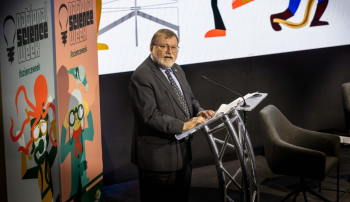On Tuesday 5 August, Australia's Chief Scientist, Prof Tony Haymet delivered a speech at the official launch of National Science Week 2025.
Hello everyone. And happy National Science Week! As Australia’s Chief Scientist, it is such a pleasure to be here today.
I begin by acknowledging the traditional custodians of the lands on which we meet – the Ngunnawal peoples.
I pay my respects to their Elders, past and present. And I acknowledge Indigenous people who are here today.
I also recognise the Indigenous knowledge systems that Aboriginal and Torres Strait Islander peoples have built up over tens-of-thousands of years.
Elevating those knowledge systems is one of Australia’s five National Science and Research Priorities. So, it’s really important that we all keep that goal in mind.
And later on this year it’s going to be a great pleasure to be with the Minister for Science, and indeed the Prime Minister, when the Prime Minister awards his first Prime Minister's prize for Indigenous knowledge systems. I think that will be a highlight in the journey of Australian science and recognition of the people of Australia.
It's great to welcome politicians in the audience. Thank you for coming. And let me welcome future politicians in the audience. Please do your science degrees, and engineering, and some of you will be lucky enough to end up in Australia's parliament. I certainly hope so.
Whether it's at a school fair or a walk in the national park or a museum visit, I encourage you to discover how science has been celebrated in your community.
Now, I'm told there's another big event happening in Canberra in a couple of weeks: the Treasurer's Economic Reform Roundtable focusing on productivity.
I mention that because it's a reminder of how science drives not just discovery but also prosperity. Ahead of the Treasurer's forum, I took part in a roundtable, along with other people here today, and my colleague, Doug Hilton from CSIRO, for example. We took part in a roundtable on Friday organised by the Minister, the Honourable Senator Tim Ayres.
Insights from that discussion, I'm sure, will be fed into the forthcoming Economic Reform Roundtable led by the Treasurer and the Prime Minister at Parliament House. It's a timely reminder of how science can help to supercharge productivity.
Science can drive our leadership in clean technologies. Science strengthens our sovereign manufacturing capabilities, enabling us to make more things here in Australia. It can boost our delivery of high value, knowledge-intensive goods and services. And it provides the tools to protect our economy and the biodiversity that underpins our economy.
In fact, science is a key building block in all five pillars of the government's productivity agenda, and it's a vital part of the Future Made in Australia initiative.
But to realise these goals, we need a scientific workforce to help us get there. So, I urge you to consider the many exciting careers in STEM - science, technology, engineering and maths. We need people with all those skills across our economy, because they are essential to Australia's future.
And this week is a great opportunity to learn about the exciting places you can go in life with STEM.
Having spent my own life in science, I know it's a team sport, and I certainly didn't get here on my own. So, I'm sending a shout-out to the people who are nurturing the next generation of Australian scientists. Among others, that includes science teachers, the parents and carers who help with homework, and the workplaces that make time for STEM students doing work experience.
Ever since I was a teenager, working at the gasket factory, science has been a wonderful lifelong adventure - stimulating, challenging, sometimes unpredictable and deeply rewarding at a personal and professional level.
I hope that this week and every week to come, you will keep in mind the great value of science and the great places it can take you.
Thank you.
(ends)
Image caption: Prof Tony Haymet delivering a speech at Questacon as part of the National Science Week launch event.

